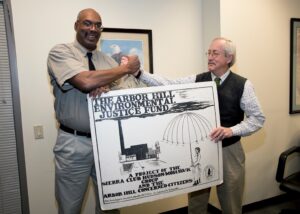At the recent Bancroft Roundtable on April 15, 2021, I had the honor of sharing the oral history journey I was lucky to experience in November 2018 while conducting a 15-hour interview with Aaron Mair, the Sierra Club’s 57th president and its first Black president.
The questions at the heart of my presentation were: How did the experience of conducting Aaron Mair’s oral history—first in South Carolina and then in Albany, New York—relate to the power of place and the importance of interconnection, two key themes that arose in Aaron’s oral history? And how has the enslavement and emancipation of Aaron’s ancestors, as well as his own life experiences, intersected with the Sierra Club’s evolving efforts toward environmental justice and its reckonings over race since the Club’s founding in 1892?
You can view my Bancroft Roundtable presentation here:
These informal Bancroft Roundtable talks bring together the campus community and the wider public to represent the fruits of research conducted at Bancroft. My interview with Aaron Mair occurred as part of the renewed Sierra Club Oral History Project, a collaboration now a half-century old that arose between the Sierra Club, one of the oldest and most influential environmental organizations in the United States, and the Oral History Center of The Bancroft Library, one of the world’s oldest organizations professionally recording and preserving oral history interviews. Over the past fifty years, this ongoing collaboration has produced an unprecedented testimony of engagement in and on behalf of the environment as experienced by individual members and leaders of Sierra Club.

Aaron Mair’s more-than two-decades of leadership within the Sierra Club has reflected a necessary and important process of change that the Club is currently experiencing, especially on issues regarding race—both with regard to the Sierra Club’s long history and for its future. I’m delighted I had the opportunity to meet Aaron and to record his life story so that others, in the future, can learn his lessons, especially as they relate to this present moment.
With regard to the power of place, Aaron Mair’s sense of self and his sense of place are deeply entangled. To nourish one’s sense of place, to acquire the sense not of ownership but of belonging, fellow Sierra Club member Wallace Stegner suggested in an essay titled “The Sense of Place” that we look around us instead of always looking ahead. Oral historians like myself typically help narrators look back and reflect on their past. However, the intense week I spent with Aaron Mair while recording his fifteen-hour oral history helped me realize how much we can learn by joining our narrators in looking around.
Aaron draws strong connections between his ancestry as a Black American and his intersectional activism for justice. And what Aaron describes as his “culture, custom, and heritage” all grow directly from particular places. Those places, in turn, have shaped Aaron’s sense of justice, his demands for equity, and his sensibilities toward environmental stewardship. In my Bancroft Roundtable talk, I shared my own experiences of visiting places with Aaron that he considers central to his own life story.

I also hope that sharing this behind-the-scenes perspective of my interview experiences with Aaron enabled consideration on the praxis of oral history, particularly to the potential importance of a narrator and an interviewer sharing embodied experiences situated in a particular place—or, in this case, particular places—notably in places the narrator finds meaningful. That embodied experience might be especially important between a white interviewer and a Black narrator. At least, I certainly found it to be important in my interview experience with Aaron Mair. The powerful places that Aaron shared with me, and the enlightening experiences they enabled for his oral history interview might raise new questions for our new era of conducting oral history interviews over Zoom. Namely, what might be lost when a narrator and interviewer no longer experience together the embodied and shared-place aspects of conducting an oral history together?